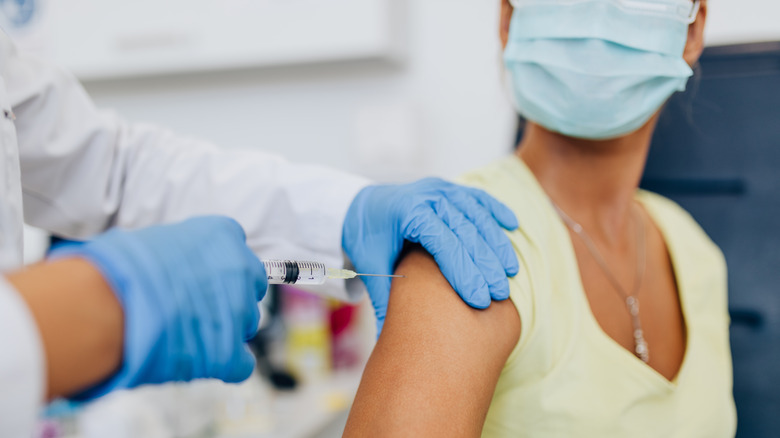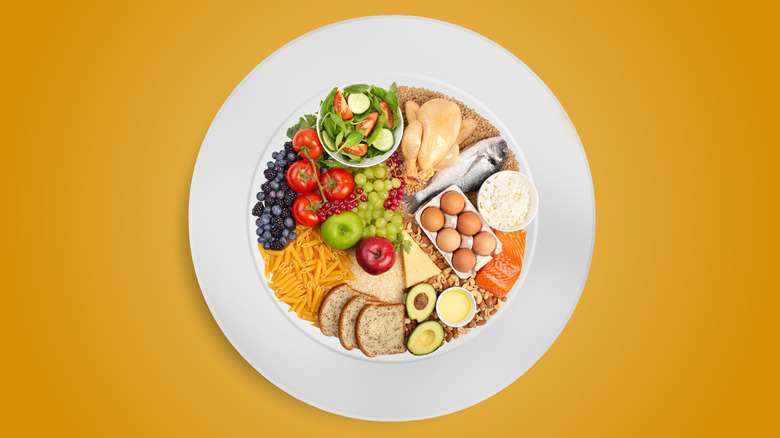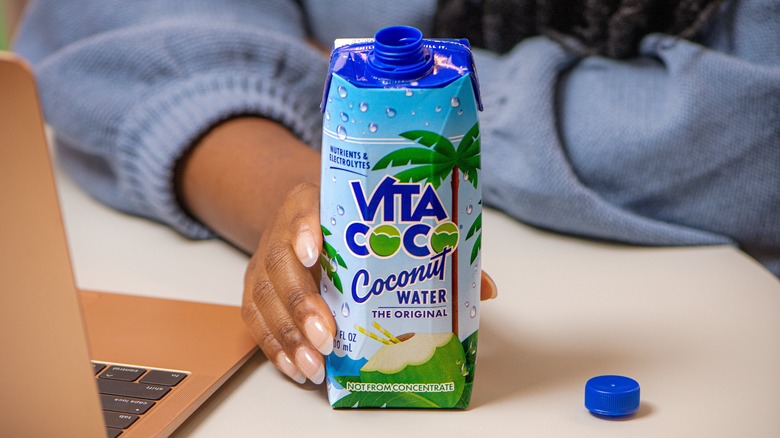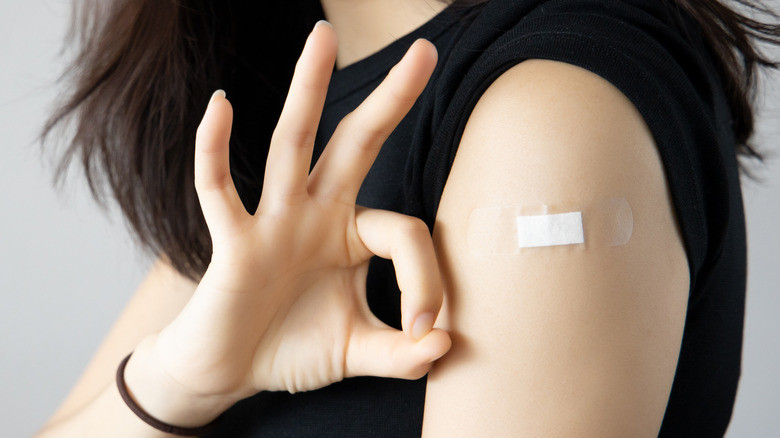Expert Explains The 'Critical' Role Nutrition Plays In Recovering From Flu Shots And COVID-19 Vaccines
Fall is not only a time for appreciating the beautiful colors of trees on long walks made refreshing by cooler weather, it is also a time to prepare for flu season. The U.S. Food and Drug Administration warns that both influenza (flu) and COVID-19 viruses are again expected to be making the rounds during the fall and winter months. So, in order to decrease your chances of getting sick, you should be safeguarding yourself with a flu shot and relevant COVID-19 vaccines so you can fight these illnesses off more effectively.
Like all vaccinations, flu shots and COVID-19 vaccines do come with side effects. For flu shots, these can range from a sore and swollen arm to nausea and fever (via Prevention). The CDC reports similar after effects for COVID-19 vaccines. Similarly, how our bodies — specifically our immune systems — react to the vaccines can manifest in symptoms like redness at injection site and fever, per McGill University.
A lot happens to your body after getting a flu shot or a COVID-19 vaccine. However, in an exclusive conversation with The List, registered dietician Diana Savani revealed that nutrition and recovery from these vaccines are closely interlinked. Here's how.
Proper nutrition is critical to maintaining a healthy immune system
Paying attention to what we eat influences factors like maintaining appropriate vitamin and mineral levels, gut health, and hydration, according to Savani. These are all key to ensuring a healthy immune system that is "ready to go at all times to protect you against illness," Savani says.
There are simple nutritional changes you can make before, the day of, and the days and weeks after your flu shot and COVID-19 vaccines that will make a big difference in how you recover from them (via EatingWell). Savani recommends focusing on foods that contain essential immunity-boosting properties like vitamins C and D and zinc every day. Citrus fruits and red bell peppers, which are high in vitamin C, and nutrient-packed vegetables like broccoli, garlic, and spinach are good go-to options, according to Healthline.
Our gut health is closely connected with our immunity as well, so Savani advises including foods rich in probiotics and fiber to promote digestive wellness. "Your digestive system makes up the majority of your body's immune strength, as the good bacteria in your gut, like probiotics, help fight off bad bacteria that pose a risk to your health," she explains. You could try adding probiotic-rich foods like kimchi and yoghurt to your daily intake, reports EatingWell.
Adequate hydration is also important
Maintaining proper hydration levels is another critical factor in determining overall immune system health, per University of California. Hydration might be even more important closer to the day of your vaccine. Savani shares that at the very least, drinking enough water can reduce your risk of falling ill even if it doesn't do anything to prevent side effects from a flu shot. "If you do develop a fever from an illness or vaccine side effect, drinking plenty of fluids can help regulate body temperature," she adds.
Our body is made up of 60% water, and proper hydration can influence biochemical pathways in our immune systems, our lymphatic system, and even histamine release, according to Nutri Advanced. However, what if you've already heard about the positive effects of drinking water every day, but you aren't the biggest fan of the taste (or lack thereof)?
"Eating fruits and vegetables, sipping on low sodium broths or tea, or drinking flavorful drinks with minimal added sugar are all beneficial for keeping the body well-hydrated," shares Savani. Coconut water (like Vita Coco), flavored fizzy water, and sugar-free tea with lemon all make good substitutes for plain water. "[They] are great options for some hydration with a little zing to keep it fun. Try blending Vita Coco coconut water with some frozen tropical fruit, spinach, Greek yogurt, and ground flax seed for a hydrating and immune-supporting smoothie that's packed with vitamin C, fiber, and probiotics," offers Savani.
Being prepared makes a big difference
There have been an increasing number of cases of flu across the U.S. recently, with a noticeable rise in the southeast and south central areas of the nation, according to STAT. And with the threat of COVID-19 pandemic far from over, people are concerned about the effectiveness in getting both the flu shot and the COVID-19 vaccines at the same time. La Jolla Institute for Immunology immunologist Shane Crotty told STAT that our immune system is great at accepting multiple things at one time. "Right now in your intestine alone, your immune system is dealing with 500,000 potential targets. Adding one more thing to that is usually just like a rain drop falling into the ocean," he explains.
What about safety and timing when it comes to getting both shots? According to Scientific American, it safe to get both jabs at the same time, and it also recommended that you get protection against the viruses as soon as possible.
Nutritional expert Diana Savani thinks that a proper diet is our best defense when it comes to recovering from the flu shot and the COVID-19 vaccine. "If you go into it with an immune system fully prepared with the armor it needs to protect you — a balanced diet with vitamins and minerals, probiotics, fiber, and plenty of water — you are doing what you can diet-wise to set your body up for success," she explains.



